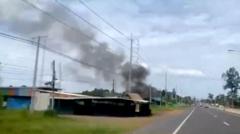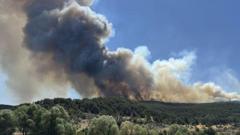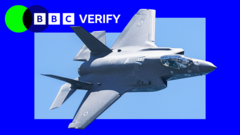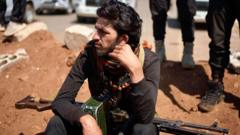Deadly clashes between Thai and Cambodian military forces have led to the reported deaths of at least twelve individuals, predominantly civilians, amid a long-standing territorial dispute.
Escalating Violence: Border Clash Claims Twelve Lives in Thailand and Cambodia

Escalating Violence: Border Clash Claims Twelve Lives in Thailand and Cambodia
Intensifying conflict at the disputed Thailand-Cambodia border results in civilian casualties and rising tensions between the nations.
Clashes erupted early Thursday between Thai and Cambodian troops stationed along a contentious section of the border, which has been a source of friction for over a century. According to Thai authorities, the fighting has resulted in at least 12 fatalities, including 11 civilians, aged between eight and fifteen, as well as one military personnel. Several others sustained injuries, although Cambodia has not confirmed any casualties on its side.
The exchange of gunfire began with both sides accusing each other of instigating the conflict, leading to a rapid escalation in violence. Allegations arose of Cambodia launching rockets, prompting Thailand to conduct airstrikes on identified Cambodian military targets. In response to the increasing peril, Thailand has completely closed its border with Cambodia, while Cambodia reacted by downgrading diplomatic relations, denouncing what it labeled as "excessive force" from the Thai army.
Authorities in both nations have urged citizens in border areas to evacuate, with Thailand temporarily relocating approximately 40,000 civilians from regions near the conflict. Local resident Sutian Phiwchan expressed concern about the seriousness of the situation, asserting that evacuations were ongoing.
This latest flare-up draws from a historical backdrop dating more than a century to the era following the French occupation of Cambodia, which led to territorial disputes. Tensions became particularly pronounced in 2008, following Cambodia's attempt to secure UNESCO World Heritage status for an 11th Century temple situated in the disputed territory—a move met with strong opposition from Thailand.
In recent months, tensions have simmered with mutual border restrictions being implemented by both nations, further straining relationships. Cambodia enacted bans on Thai imports, including fresh produce, and halted essential services like power and internet.
Thai acting Premier Phumtham Wechayachai acknowledged the delicate nature of the situation, emphasizing the need for a cautious and lawful approach to conflict resolution. Meanwhile, Cambodian Prime Minister Hun Manet articulated a desire for peaceful resolution, albeit with a readiness to defend against perceived aggression.
While the fierce exchanges of gunfire have tended to de-escalate quickly, a broader concern looms over the leadership in both countries, as neither appears to possess the firm authority required to de-escalate tensions effectively. Hun Manet, a newcomer to power and son of a former strongman, faces challenges in establishing his governance, while former Thai leader Thaksin Shinawatra's coalition government grapples with its fragile status amidst rising nationalist sentiments.
As both nations navigate this fraught situation, the hope remains that constructive dialogue can avert a further escalation into sustained violence—a prospect that both countries, mindful of their shared history, find difficult in the current climate.




















